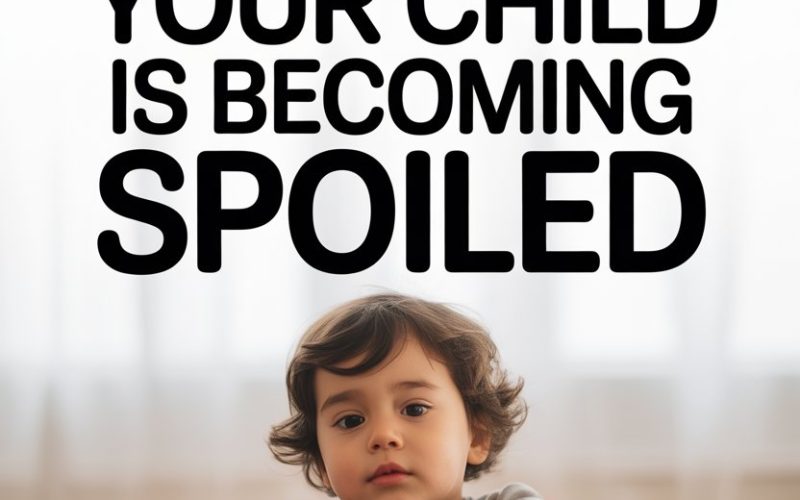Quick question, and be honest: When was the last time you heard the phrase “That’s not fair!” in your house… followed by a foot stomp, a dramatic exit, or an attempt to negotiate like a pint-sized lawyer?
If you’re mentally scrolling through a highlight reel of recent tantrums, you’re not alone.
Many parents have a nagging fear their little cherub might be transforming into a tiny tyrant—one who expects the red carpet treatment, every single day.
Don’t panic. Spotting the difference between a child who’s just having a rough afternoon and one who’s genuinely spoiled isn’t always straightforward.
You’re probably doing a much better job than you think. (Perfection not required—unless you want to compete with Instagram parents, in which case, best of luck.)
Here are five unmistakable signs a child is on the express train to Spoiledville, and—more importantly—how you can get them back on track.
1. The Art of the Constant Demand
Some children have perfected the “I want” chant.
New toy at breakfast? Of course. Ice cream for dinner? Naturally. Extra screen time because they blinked twice? Why not.
When requests morph into relentless demands, and the answer “no” is met with Oscar-worthy theatrics, it’s a good indicator you’re entering spoiled territory.
Psychologists warn that indulging every whim doesn’t just clutter bedrooms with plastic trinkets; it actually stunts emotional growth.
Children become less patient, less resilient, and more entitled, according to child development experts at the University of Michigan.
What to do when you feel like the family butler instead of the parent? Start practising the lost art of “no” (or, for the brave, “not right now”). Don’t leap to meet every desire.
If your child flips out, stay calm—big feelings are part of learning boundaries. Over time, your consistent limits will help them discover that life sometimes says “no,” and the world doesn’t end.
And if they claim boredom as a crisis? Congratulations. Unstructured time is where creativity is born—just ask any kid who’s built a spaceship out of sofa cushions.
2. Meltdowns as a Negotiation Tool
Picture this: Your child is denied their second biscuit, and suddenly, you’re starring in a live-action soap opera. Tears, wails, maybe even a dramatic flop onto the floor.
These aren’t your run-of-the-mill upsets; these are tactical meltdowns, and you know it because they seem to appear only when a “no” is uttered.
This behaviour isn’t just emotionally exhausting (for you and the neighbours). It can signal your child is used to getting their way by turning on the waterworks or unleashing the full force of their tiny rage.
According to clinical psychologist Dr. Laura Markham, giving in to these performances only reinforces that drama equals results.
How do you short-circuit this pattern? Try acknowledging their feelings without caving—“I see you’re really upset because you want that biscuit. It’s tough when we can’t have what we want.”
Hold your ground. Consistency is the secret weapon here.
If public scenes make you want to dig a hole and disappear, take solace in knowing that every parent has been there. Yes, even the ones who claim their kids eat kale chips willingly.
3. Lack of Gratitude and Empathy
One telltale sign your child may be veering into spoiled territory is the absence of a simple “thank you”—or worse, acting as if gifts, treats, or acts of kindness are simply their birthright.
Gratitude isn’t something kids just pick up from the air; it’s learned through practice, repetition, and watching adults model it.
When your child breezes past a generous gesture without acknowledgment, or seems oblivious to the feelings of others (like snatching toys without a second thought), it’s time for a reset.
Research from the Greater Good Science Center at UC Berkeley shows that encouraging gratitude and empathy is one of the best predictors of long-term happiness and healthy relationships.
How can you gently course-correct? Make thank-yous non-negotiable—both spoken and, for older kids, written.
Involve children in acts of giving, whether it’s donating toys or helping a sibling. Share your own gratitude out loud (“I’m so happy you helped set the table tonight. That made my day easier.”).
Over time, these little moments stack up, and even the most self-absorbed mini-me starts to notice the feelings of others.
4. Refusal to Pitch In
Chores are not exactly the stuff of childhood dreams (unless you’re raising the world’s only child who longs to scrub the loo).
Still, an outright refusal to help with age-appropriate tasks—feeding the family cat, picking up toys, or rinsing their own dishes—can be a bright red flag.
A sense of entitlement often grows when children never have responsibilities. According to developmental psychologist Dr. Richard Weissbourd, contributing to the family teaches kids they’re part of a team, not just the star player.
If your child acts like chores are beneath them, or expects you to do everything, start small. Assign simple, achievable tasks—even toddlers can put dirty clothes in the laundry basket. Praise effort, not perfection.
For older kids, consider a weekly family “jobs jar” where everyone draws a fun (or at least tolerable) chore.
Resist the temptation to redo their wobbly attempts. Think of it as character-building, not housekeeping.
And always remember: You’re raising future flatmates, not future royalty.
5. Struggles With “No” or “Wait”
Patience may be a virtue, but to a spoiled child, it’s a foreign language. Instant gratification is their native tongue.
If your child can’t handle delayed rewards—a new game, a sweet treat, your undivided attention—without sulking, pestering, or launching a guilt trip, it’s time for a little tough love.
The famous “marshmallow test” (where children who waited for a second marshmallow showed better self-control later in life) is often cited for good reason: Kids who learn to delay gratification fare better across the board—academics, relationships, even mental health.
Start practising patience in tiny increments.
If they demand a treat, set a timer for five minutes. If they want to play a game with you, ask them to help clear the table first.
Celebrate their efforts to wait, even if it’s only for a minute. Over time, you’ll see stamina grow—and your own sanity might just make a comeback.
And don’t forget: If all else fails, it’s absolutely legal to hide in the bathroom for five minutes with a biscuit of your own. Self-care, friends.
Raising Kids Who Appreciate, Not Expect
Raising children who are grateful, resilient, and empathetic isn’t about perfection or never spoiling them (we all sneak treats into the trolley sometimes).
It’s about balance, boundaries, and intentional choices, day after day—even on the days when you’re running on caffeine and sheer willpower.
If you’ve recognised one (or a few) of these signs in your household, don’t panic. Spoiling is a habit, not a life sentence. Every family slips into easy ruts—especially when tired or overwhelmed.
What matters most is your willingness to shift gears, set limits with love, and model the kind of behaviour you want to see.
A little less “I want!” and a little more “Thank you” can work wonders. And one day, believe it or not, you’ll spot your child holding the door for someone, sharing their last biscuit, or saying “no problem” when asked to help.
That’s when you’ll know all the gentle, imperfect effort was worth it.
Parenting: messy, marvellous, and—sometimes—miraculously rewarding.
Keep going. You’ve got this.




